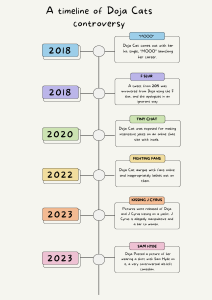Overwatch 2 and the rise of “anti-consumerism” in the game industry

Employees protest outside of Blizzard headquarters in Irvine, California
December 20, 2022
On October 4th 2022, Blizzard Entertainment released “Overwatch 2” for free on all gaming platforms, exciting fans of the original 2016 release of Overwatch. “The launch of Overwatch 2 has been such an important moment for Blizzard. We’re thrilled to bring new players from around the world into Overwatch’s vibrant universe while welcoming back the existing Blizzard community,” said Mike Ybarra, president of Blizzard Entertainment.
While the concept of releasing the game for free may sound generous, it highlights a growing problem within the gaming industry. Game developers often release unfinished products under the term “Early Access” without promised features or proper technical support. In the past, unfinished games would release for a short time period for developers to collect data and fix problems before the official retail release.
Over time, however, companies began to charge money or implement paid aspects of the game in order to reap the rewards of putting out a complete product without actually completing the product. Consumers are left with nothing, but the company’s promise to finish the game at a later date.
Overwatch 2 was advertised featuring a “co-op mode” where players would team up online to play through a brand new story. However, this feature was delayed until sometime in 2023, despite the game launching in October.
What players received at the launch of Overwatch 2 was essentially the same exact game as the first Overwatch game, with notable quality control features removed. Unless players bought the first game back in 2016, new players were met with a mountain of locked content. One of the main features of the series is the vast selection of playable characters, each with their own roles and abilities. New players are only given a handful of characters at first, being forced to play the game for around 40 hours to get enough of the in-game currency to unlock all characters.
The first game retailed at $60 and with it came a fair experience in which you could unlock all the game’s content and unique customization options for no additional cost. In a game entirely based around swapping characters in order to create the best team possible, not having access to all characters is a massive disadvantage. The first Overwatch game is no longer playable as a result of Blizzard Entertainment shutting servers down, forcing fans who paid for the previous game to put their time and money into the new game for a similar experience.
Another massively popular game called “Fortnite” created an extremely successful way of making money off of free content, with the implementation of an online market of cosmetic customizations that players could buy with real money. An innovative feature pioneered by Epic Games for Fortnite called “The Battle Pass,” a system in which players would pay $10 for the possibility to unlock content given that they play enough and complete challenges within a time limit of around 10-12 weeks, provided the company with profit opportunities within their free game.
However, when using this model of business in other contexts, many problems arise. Imagine going to a shoe store and purchasing a pair of shoes, only for the cashier to tell you that you need to work a certain amount of hours at that store in order to receive your shoes. This system relies heavily on creating a sense of urgency for players to buy these limited-time items before they’re gone, creating artificial scarcity. Realistically, it costs game companies nothing to infinitely replicate these online items.
One infamous game perfectly embodies the “anti-consumer” climate of modern gaming: “Fallout 76,” released by Bethesda Game Studios in October of 2018, was notorious for its poor release. Players experienced a massive amount of bugs and crashes which prevented them from playing the game, with some PC players’ computers completely losing all of their data as a result from a glitch while installing the game. Hard copies of the game were sold as cardboard discs with a one time use code to download the game online, preventing the consumer from later selling the game if they did not want it, and ensuring Bethesda could continue to sell the game at whatever price they choose.
In the midst of public backlash, Bethesda implemented a paid feature in which players could purchase advantageous items for very high prices, making the game free to play and offering no refunds for those who purchased the almost unplayable game months prior.
“Fallout 76 is in need of so much other attention, but you’re still able to spend money on cosmetics from the storefront adds some insult to the overall injury,” says Brandin Tyrrel, a game reviewer from the popular online gaming site ign.com. Ultimately, Bethesda would receive a class action lawsuit for their inconsistent refund policy as well as false advertising related to a $200 “Power Armor Edition” of the game.
Since then, many game companies have cited rising labor costs as justification for price increases and misleading marketing. Recently, Call of Duty Modern Warfare II was sold at a price of $70, a $10 increase from the industry standard of $60.
Customers are not the only ones harmed by the rampant corporate greed of the industry; employees are hurt as well. Developers, artists, actors, writers, and many more talented people are commonly exploited whilst working in the gaming industry. Almost every major gaming studio has been accused of “Crunching,” a practice in which employees are pressured by upper management to work up to twelve hour shifts, work six to seven days a week, and are given unrealistic deadlines. Without any sort of government or union protection against “Crunching,” employees must seek other work or give in to the demands.
Blizzard Entertainment faced a lawsuit from the California Department of Fair Employment and Housing after a two year investigation. The lawsuit alleged that “Women were steered into the lower levels of Defendants’ hierarchy and often had to work harder and longer to earn equal promotional and other opportunities as their male counterparts.” Countless reports of harassment are available online, describing the toxic work atmosphere of the Overwatch 2 developers. The official lawsuit can be found here
Not only did fans lose out on game quality with the problematic release of Overwatch 2, but the creators of the game faced exploitative and toxic work environments. While Overwatch 2 hasn’t been the worst example of exploitation when compared to other games, it highlights the contempt gaming companies have towards criticism and public backlash. Corporations will almost always choose to take the easiest and most profitable option rather than delivering a quality product or ensuring a legal and safe environment for its workers. So long as consumers continue to purchase exploitative content, game studios will continue their harmful practices. Words alone haven’t stopped this issue, but the numbers on their sales charts just might.








